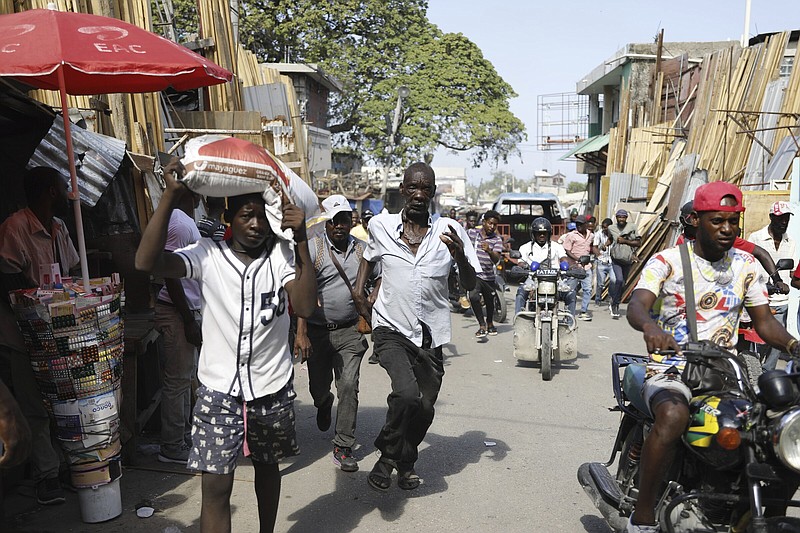PORT-AU-PRINCE, Haiti -- Haiti's government said Thursday that it was extending a state of emergency and nighttime curfew to try and curb violent gang attacks that have paralyzed the capital of Port-au-Prince in a fierce battle for political power.
An initial three-day curfew was announced over the weekend, but gangs have continued to attack police stations and other state institutions at night as Haiti's National Police struggles to contain the violence with limited staff and resources.
"The people with the guns are essentially the current arbiter of Haitian politics," said Robert Fatton, a Haitian politics expert at the University of Virginia. "The gangs have won the battle so far."
The attacks began a week ago, shortly after embattled Prime Minister Ariel Henry agreed to hold general elections in mid-2025 while attending a meeting of Caribbean leaders in Guyana. Gangs have burned police stations, shot up the main international airport, which remains closed, and raided Haiti's two biggest prisons, freeing more than 4,000 inmates.
During that time, Henry had traveled to Kenya to push for the deployment of a U.N.-backed police force from the East African country to help fight gangs in Haiti. But a court in January ruled that the deployment was unconstitutional, and it wasn't clear if the force would deploy given the worsening violence in Haiti.
Henry is currently in Puerto Rico, where he was forced to land on Tuesday after the armed groups laid siege to the international airport, preventing him from returning.
Dozens of people have died in Haiti's recent gang attacks, including several police officers. The violence also has left more than 15,000 people homeless, in addition to some 300,000 Haitians who lost their homes to gang wars in recent years.
Also, there were reports that gangs on Thursday looted shipping containers filled with food at the main port in Port-au-Prince, raising concerns that provisions in the capital and elsewhere would dwindle quickly.
"If we cannot access those containers, Haiti will go hungry soon," said Laurent Uwumuremyi, Haiti director for Mercy Corps.
U.N. spokesman Stephane Dujarric said Thursday that the insecurity has forced the World Food Program to suspend its maritime transport service, which is currently the only means of moving food and medical supplies for aid organizations from Port-au-Prince to other parts of the country. Two dozen trucks with equipment, medical supplies and food are stuck at the port in Port-au-Prince, he noted.
He also said the U.N. special envoy for Haiti, Maria Isabel Salvador, is calling for the immediate deployment of a U.N.-backed force "to prevent the country from plunging even further into chaos, as gang violence in Haiti has reached unprecedented levels."
Salvador remains in close contact with the prime minister, the government and other parties across the political spectrum "to encourage a peaceful and constructive inter-Haitian dialogue to promote a nationally owned political solution to this crisis," Dujarric said.
Meanwhile, a U.S. Defense official said a Marine Corps Fleet Anti-terrorism Security Team, or FAST team, was to be deployed to Haiti to protect the U.S. Embassy. The official spoke on the condition of anonymity because he was not authorized to discuss the deployment. A final decision on the deployment has not yet been made.
"The country is falling apart, and everyone is watching," said Fatton, who criticized the U.S. government for not taking action more than two years ago and lamented the current state of Haiti. "I am dumbfounded. I thought I had seen everything."
Gunfire still echoed in parts of Port-au-Prince on Thursday, with blazing tires blocking some areas as people demanded new leaders for the battered country. Schools and businesses remained closed, but calm returned to a handful of neighborhoods that saw some stores and banks open under a limited schedule.
Haiti's worsening crisis prompted the Royal Bahamas Police Force to announce Thursday that it had set up a blockade in the southeast part of the archipelago given the two jail breaks and the "mass displacement" of Haitians due to the ongoing violence. The Bahamas, about 530 miles to the north, is a popular destination for Haitians fleeing their country.
Information for this article was contributed by Edith M. Lederer, Tara Copp and Bert Wilkinson of The Associated Press.
